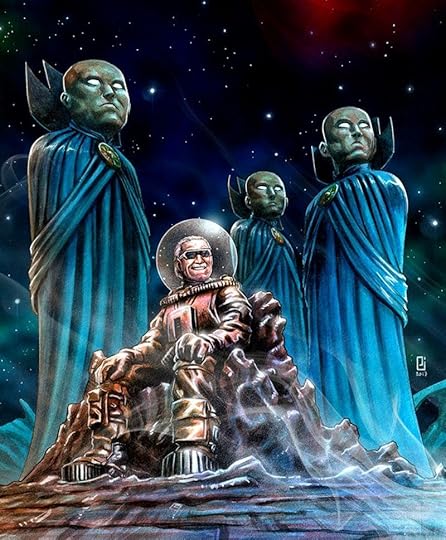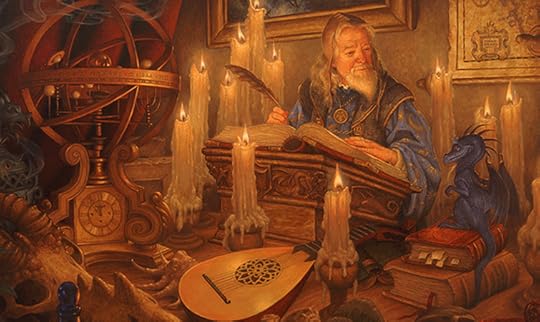These past few years I've become increasingly convinced that the narrator should always be a character within the confines of the story, even when it's not told in first person.
Someone had to record all these events for the later generations to read, after all. And that someone can't be just me, as I was never there to witness it. Otherwise I might as well be making it all up. Right?

They might be the main hero, as is the case with the true first-person narrative. They might be a sidekick or a follower or some other hang-around, witnessing the events first-hand but having a lesser impact in them all. They might be some historian or chronicler that heard of the events later on, or researched them well after the fact, then finally jotted them down. They might be a sorcerer watching it all from afar through their crystal ball, or some god or other high entity looking down from their cloud.
And yet none of them are entirely reliable, nor trustworthy. The main hero may be lying to make themselves look good, or if they're truly heroic, to downplay their efforts and impact. Their follower's perception might be skewed by wide-eyed hero worship, or by grumpy cynicism and the idea that they alone see the hero's flaws. Either one of them may forget stuff. The historians will of course have a puzzle to put together with several pieces mismatched, fitting to same spots in different ways, or missing altogether. Even the truly omniscient cosmic beings may have their priorities in the wrong order, might decide to skip something interesting or important while paying inordinate attention to something we humans would find completely irrelevant, or might pick sides and praise someone in-story while beating down somebody else, and you might no longer be certain if these events happened how they did.
Sometimes there's more than one narrator. One of my long-term projects involves a knight, his squire, and their retainers going out into the wild. Each of them keeps a journal, and each one gives a different interpretation of the events - sometimes these vary wildly and it's up to the reader whom to believe. Another is narrated by an ill-educated mercenary, who can't actually write and thus has recruited this old nun to scribe it down for him - and they
both have their priorities and prejudicies that occasionally clash. I feel that both stories have things to say, that I'm challenged by writing them and improve myself in doing so, and that I'm having a jolly great time with them.

And of course, the view will depend on whether the narrator is actually present in the scene or not - and allows for interesting possibilities where they show up in the middle of it. I'm still a bit proud of the little trick I did where the narrator suddenly swooped in and rescued the main heroes from a bind. If the story's been third person up until that point, this sort of a thing can make for an effective twist.
Many people say that one advantage of first-person narrative is how it gets us straight into the head of the protagonist, to hear what they think and feel what they feel. I don't know about this one. Doesn't close third-person already do it well enough? If that's all you want, then I think you may as well stick with third-person and keep it real close, like what Harry Potter does. True first person view brings with it more opportunities, outlined above, yet also the responsibility of making it seem like it
was written down or told to someone long after the fact, else there's dissonance that will throw me off out of it. All too much of first-person literature fails at doing either one of these, which is a shame and a missed opportunity.
Whether you do first- or third-person, your narrative style will offer its own set of possibilities. Use them! Try new things and break new ground! Is that not what fiction is all about?

 newest »
newest »
 newest »
newest »
 Lorenzo wrote: "There is a bit of the issue with the first person view, though.
Lorenzo wrote: "There is a bit of the issue with the first person view, though.






You know, when you narrate in first person, you're strongly implying that the narrator -and protagonist- won't die in the story as he's telling the story itself.
I doubt many stories would have the narrator halfway in the book saying "And then I died.".